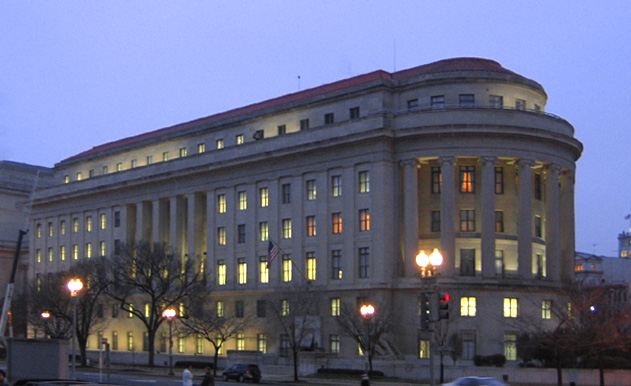As of last year, more than a third of the world’s largest publicly traded companies had set targets to reach net zero carbon emissions, up from a fifth in December 2020. But a dirty little secret lies behind most net zero commitments: Companies are buying carbon offsets to meet their goals — paying for absolution just like pre-Reformation Catholics buying Indulgences to offset their sins.
Under the law, the U.S. Federal Trade Commission has the power to hold companies liable for marketing that harms consumers’ health or wealth by misleading them into buying a product or service based on a false or deceptive claim. The FTC just closed public comment on how to amend its classic Green Guides in light of new market realities — the first such update in a decade. The Guides lay out the do’s and don’ts for companies seeking to make green marketing claims and provide a basis for the FTC to impose hefty financial penalties for violations.
Of the many types of claims the FTC sought input on — including terms such as ‘recyclable,’ ‘eco-friendly,’ and ‘sustainable,’ — carbon offsets are arguably the most significant due to their dismal record of abuse and failure. Last year, an investigation found the Verra carbon offsets registry, the biggest in the world, was running a scheme that “could make global heating worse.” The Guardian reported that “more than 90 percent of its tropical forest offset credits are likely to be ‘phantom credits’ and do not represent genuine carbon reductions.” Verra’s chief executive has since resigned, though the company remains a key market player.
Civil society and courts in Europe are pushing back. Dutch campaigners sued airline KLM it for its “Fly Responsibly” ad campaign last year, which claimed the airline was on a path to net zero emissions despite substantial reliance on carbon offsets. The airline has pulled certain ads from the market. JBS, the world’s largest meat company — whose methane emissions exceed the combined livestock methane emissions of France, Germany, Canada and New Zealand — has also claimed to be on a net zero pathway based on offsets. After a complaint filed by the Institute for Agriculture and Trade Policy, an industry marketing watchdog called on JBS to discontinue its net zero claims.
Despite the proliferation of new cases of fraud and abuse in the carbon offsets market, Morgan Stanley just forecast that the voluntary carbon offset market will grow from $2 billion in 2020 to around $250 billion by 2050 as companies feel even more pressure to meet their net zero pledges. The FTC must block this tide of greenwashing with the full weight of its enforcement authority under Section 5 of the Federal Trade Commission Act (15 U.S.C. § 45), which empowers the agency to investigate and prevent unfair or deceptive acts or practices affecting commerce.
Enforcement
FTC investigations are no joke: In 2020, FTC enforcement resulted in Volkswagen and Porsche repaying more than $9.5 billion to car buyers who were deceived by a “Clean Diesel” ad campaign. Last year, the agency brought and won an enforcement action against Walmart and Kohl’s for claiming products were made from “eco-friendly & sustainable” bamboo when they were actually made of rayon, which is made using toxic chemicals and releases a variety of hazardous air pollutants in the process. A 2021 greenwashing case filed with the FTC by environmental groups against Chevron is still pending.
The FTC is not the only federal agency with authority to rein in carbon offsets. The Commodity Futures Trading Commission also has enforcement authority over carbon offsets that are packaged into financial derivatives bought and sold on futures exchanges. The Securities and Exchange Commission will also have a significant role in deciding whether and when to list carbon offsets products as they start to become securitized and traded on the stock market. The Department of the Treasury, too, is taking a closer look at what offsets mean for the banking sector and financial stability.
With diverse U.S. regulators poised for action on offsets, there is a powerful opportunity for coordination and consensus. Many people involved in climate policy privately acknowledge the limitations of carbon offsets. There is a countervailing anxiety that the world will not be able to muster the financial capital needed for the low-carbon transition absent significant new inflows from the private sector. But if the capital flows towards false solutions, then nothing has been gained and everything could be lost. Another concern is that companies and financial institutions will simply drop out of various climate pacts and net-zero alliances if they can’t lean on offsets. So be it. The only credible path to net zero is an inside job.
Regulators and standard setters abroad understand the stakes. This is make-or-break time for the climate and there is no time left for false solutions. That’s why the gold standard for net zero planning, the SBTi Corporate Net-Zero Standard, explicitly prohibits the use of offsets: “Carbon credits do not count as reductions toward meeting science-based targets. Companies should only account for reductions that occur within their operations and value chain.”
The FTC must hold corporations accountable for deceptive marketing around carbon offsets and net zero claims. Misrepresenting green commitments and hiding behind offsets is harmful to consumers who deserve to get what they pay for. It is also devastating to the climate challenge, which requires real solutions right now. Carbon offsets, together with claims that natural gas is “clean,” and inflated renewable energy pledges, insulate companies from doing the hard work of reforming their business models, and charting a new course consistent with a world without fossil fuels.
The FTC has a special opportunity to act now using its existing enforcement powers — no new regulations or acts of Congress needed. United Nations Secretary General Antonio Guterres is right: “We must have zero tolerance for net zero greenwashing.” The FTC should adopt the same zero tolerance policy for carbon offsets, which are deceptive and fraudulent by nature. American consumers deserve better.
Clara Vondrich is senior policy counsel at Public Citizen’s Climate Program.
Subscribe to our newsletter
Stay up to date with DeSmog news and alerts







